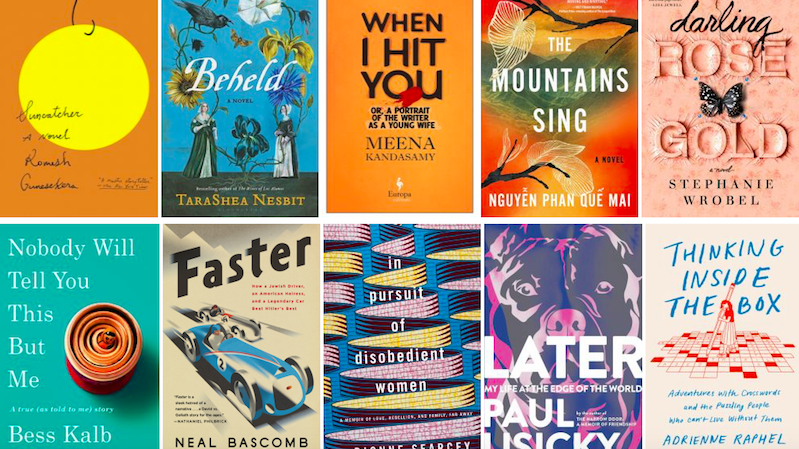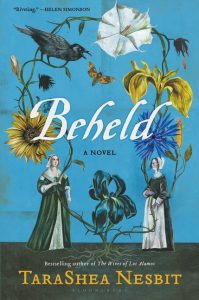
Romesh Gunesekera’s Suncatcher, TaraShea Nesbit’s Beheld, Bess Kalb’s Nobody Will Tell You This But Me, and Paul Lisicky’s Later all feature among the Best Reviewed Books of the Week.
1. Suncatcher by Romesh Gunesekera
4 Rave • 5 Positive • 2 Mixed • 1 Pan
“… captures this identity-altering brand of infatuation brilliantly … Gunesekera’s prose is lush yet luminously clear, and Kairo—as he deciphers the world around him and his place in that world—is the perfect guide to the book’s turbulent setting. Kairo’s sense of cultural stirrings beyond Colombo is vivid, too … Even the post-colonial politics of the book are couched in fanciful terms … fresh … wonderful.”
–Michael Upchurch (The Boston Globe)
Read an excerpt from Suncatcher here

2. Beheld by TaraShea Nesbit
2 Rave • 6 Positive
“Perhaps my being English distorts my reading here, but I see something else at the novel’s core, a critique of Englishness itself. There is a contradiction underpinning the whole project of English imperialism, and Nesbit flags it perfectly … For all the novel’s quietness of telling, its currency is the human capacity for cruelty and subjugation, of pretty much everyone by pretty much everyone … The depiction of cruelty is all the more nuanced for being told through the prism of the female characters. They are not weak, but they are powerless, ruled by men and God … It’s here, in the narration, that the novel finds itself—in the equable plainness of its language, a plainness that is nevertheless impressionistic and light-filled. There are some bright, startled moments in which Nesbit makes something utterly recognizable and mundane, yet also utterly other.”
–Samantha Harvey (The New York Times Book Review)
Read “Flyover and Proud: TaraShea Nesbit Reckons With Home” here
3. When I Hit You: Or, A Portrait of the Writer as a Young Wife by Meena Kandasamy
3 Rave • 4 Positive
“…a very of-the-moment story of domestic abuse … Intellectual and physical cruelty is explored with Nabokovian ingenuity … It’s gasp-worthy reading. Reading with the stomach. The process itself becomes precarious and unsafe, trapping you within three rooms in Mangalore. Yet it is also through writing that the only oases come … though thoroughly harrowing, Kandasamy’s writing is also funny, tender and lyrical, usually simultaneously. When trauma is ever-present, the other qualities only have the option to mix with it … But Kandamasay’s lyrical register can add a tinge of grandiosity and melodrama that the narrative doesn’t require … Yet Kandasamy has given us a 3D, complex experience of abuse, full of roundly-explored characters, without compromising the purity of her message.”
–Jonathan McAloon (The Irish Times)
4. The Mountains Sing by Nguyễn Phan Quế Mai
3 Rave • 3 Positive • 1 Mixed
“… absorbing, stirring … Que Mai contains her saga with a poet’s discipline, crafting spare and unsparing sentences, and uplifts it with a poet’s antenna for beauty in the most desolate circumstances. She evokes the landscape hauntingly, as a site of loss so profound it assumes the quality of fable … Through her depiction of sympathetic characters suffering under a repressive regime, Que Mai offers us in The Mountains Sing a novel that, in more than one sense, remedies history.”
–Gaiutra Bahadur (The New York Times Book Review)
5. Darling Rose Gold by Stephanie Wrobel
2 Rave • 4 Positive • 1 Mixed
“Darling Rose Gold works well as an intense look at a dysfunctional mother-daughter relationship, a tale of manipulation and how one person’s devastating secrets and lies reverberate through a community and a family. Darling Rose Gold briskly moves with surprising twists as Wrobel delivers assured character studies … Darling Rose Gold delves deep into the psyche of mother and daughter and what motivates each of them. Both are vividly sculpted as Wrobel shows Rose Gold’s lack of social skills and her difficulties at adjusting to independence from her mother, while Patty, who seems so likable, wants to regain control over her daughter.”
–Connie H. Ogill (Associated Press)
Read Stephanie Wrobel on twist endings here
**
1. Nobody Will Tell You This But Me: A true (as told to me) story by Bess Kalb
4 Rave • 3 Positive
“…kudos to Kalb, who pulls off this daring approach brilliantly, allowing readers to hear her grandmother’s inimitable voice … Not surprisingly, given Kalb’s chosen career, there are laughs galore throughout the book … Yet this account runs much deeper than a typical comedy routine. Kalb frequently shares the immense challenge of imagining her grandmother’s voice … These many enthralling tales (along with family photographs) unfold in a carefully structured yet nonlinear fashion (think This Is Us). The result is lively and fascinating, funny yet poignant … In a bold stroke of literary bravura, Kalb has turned the formula for writing memoirs inside out, bringing her grandmother’s distinctive voice back to life and sharing it with a legion of lucky readers.”
–Alice Cary (BookPage)
2. Faster: How a Jewish Driver, an American Heiress, and a Legendary Car Beat Hitler’s Best by Neal Bascomb
2 Rave • 5 Positive
“Bascomb has done a masterful job of framing a tale in a rich historical context, full of compelling characters, political and social intrigue, engineering marvels and dramatic descriptions of the dangerous world of auto racing. His thoroughly researched and documented book brings the venues to life, full of the smell of racing fuel, the sound of roaring exhausts, and the thrill of speed … Bascomb has a knack for explaining the science and art of automotive design and racing without falling into the trap of too much gearhead talk for the general reader. Auto buffs will enjoy the rich detail, while those non-auto fans will be involved with the storytelling and drama.”
–Jason Fogelson (Forbes)
3. In Pursuit of Disobedient Women: A Memoir of Love, Rebellion, and Family, Far Away by Dionne Searcey
2 Rave • 4 Positive
“In Pursuit of Disobedient Women is Searcey’s captivating, straight-ahead memoir of their three years in Dakar, Senegal. There is plenty here about family … But while her family life is part of the narrative, what Searcey really wants to talk about are the stories of the people who live there. And my gosh, they are fascinating … Searcey’s writing is plain and unvarnished; she pretties nothing up. A journalist’s journalist, she lets the details and characters provide the drama and plays down her own role, giving enormous credit to the local journalists and translators who work with her … Frankly, all of the stories she tells seem astounding to me. Searcey gravitates toward stories about women, and the women she interviewed have endured almost unfathomable trauma and yet tell their stories bravely … What is astounding is the poise and fortitude that these women exhibit in telling their stories to a Western journalist. Also astounding is how many of these tales Searcey was able to absorb over three years.”
–Laurie Hertzel (The Minneapolis Star Tribune)
Read an excerpt from In Pursuit of Disobedient Women here
4. Later: My Life at the Edge of the World by Paul Lisicky
1 Rave • 5 Positive • 1 Mixed
“His analysis of…relationships is part revelatory for his keen powers of observation, part heartbreaking, and all human … Lisicky is a gifted writer. With meticulous emotional nuance, he not only captures his day-to-day, but manages to translate lessons from the day-to-day into a manual for living … gorgeous … Later is beautifully composed and structured … ‘every death will always be an AIDS death; everyone will always die before their time, whether they’re twenty-one or ninety-one.’ And that perhaps, is Later‘s greatest lesson.”
–Martha Anne Toll (NPR)
5. Thinking Inside the Box: Adventures with Crosswords and the Puzzling People Who Can’t Live Without Them by Adrienne Raphel
6 Positive
“…I read Thinking Inside the Box and realised the richness of the American relationship to crosswords. Adrienne Raphel, an aficionado, mixes history with reportage from the crossword frontlines … Her writing is packed with the sort of beautifully observed details you’d expect from a New Yorker contributor.”
–Susie Mesure (The Guardian)
Read Adrienne Raphel talking to poets about their love of crossword puzzles here

